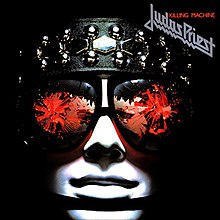Killing Machine
| Killing Machine | ||||
|---|---|---|---|---|
 |
||||
| Studio album by Judas Priest | ||||
| Released | 9 October 1978 (UK) 28 February 1979 (US) |
|||
| Recorded | August – September 1978 at Utopia and CBS Studios, London | |||
| Genre | Heavy metal | |||
| Length |
35:06 (Killing Machine) 38:30 (Hell Bent For Leather) |
|||
| Label | Columbia | |||
| Producer | Judas Priest, James Guthrie | |||
| Judas Priest chronology | ||||
|
||||
| Singles from Killing Machine | ||||
|
||||
| Professional ratings | |
|---|---|
| Review scores | |
| Source | Rating |
| Allmusic | |
35:06 (Killing Machine)
Killing Machine (known as Hell Bent for Leather in the US due to controversy at the time of release) is the fifth studio album by British heavy metal band Judas Priest. With its release in October 1978, the album pushed the band towards a more commercial style; however, it still contained the dark lyrical themes of their previous albums. At about the same time, the band members adopted their now-famous "leather-and-studs" fashion image. It is the band's last studio album to feature drummer Les Binks.
Killing Machine was retitled Hell Bent for Leather for its U.S. release in early 1979, because the U.S. branch of Columbia/CBS did not like the "murderous implications" of the album title. Both titles are drawn from songs on the album with "The Green Manalishi (With the Two Prong Crown)", an early Fleetwood Mac cover, being added to the recording.
The album was also pressed in red vinyl in the UK.
With Killing Machine, Judas Priest began moving to a more accessible, commercial format that abandoned the complex, fantasy-themed songs of their previous three albums. While this album still had dark undertones, it was more grounded in realism. This was reflected in their change of stage costumes from flowing Gothic robes to leather, but also may have been inspired by the rising punk and New Wave movements. Glenn Tipton said in a contemporary interview that "I believe we are part of the New Wave. After all, we're fast, aggressive and exciting, which is what it's all about." Tracks such as "Burnin' Up" and "Evil Fantasies" are replete with S&M themes while "Running Wild" is about late-night partying and "Before the Dawn" a depressing ballad. "Hell Bent for Leather" reflected their newly adopted leather costumes as well as Rob Halford's soon-to-be-trademark entrances on stage in a Harley-Davidson motorcycle. The single "Take on the World" was an attempt at producing a stadium shoutalong tune in the mould of Queen's "We Will Rock You", and was also covered by New Wave band The Human League on their 1980 tour. If the lyrics were simplified a bit from the band's previous albums and adapted more into mainstream arena rock, the instruments retained their characteristic aggressiveness with heavier guitar riffing and elements of blues influence returned on some songs. The album is certified gold by the RIAA. Finally, the production of Killing Machine was markedly improved from Judas Priest's earlier albums, which were criticized for having excessively flat sound, and would be further refined for their next and breakthrough album, British Steel.
...
Wikipedia
